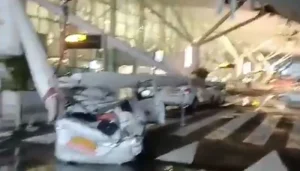UN nuclear watchdog reports 168 occurrences of nuclear material thefts in 2022, calls for ‘vigilance’
UN nuclear watchdog report:
The United Nations nuclear watchdog urged “vigilance” against the trafficking of nuclear and other hazardous materials on Monday, citing more than 4,200 thefts or other events over the last 30 years.
According to the International Atomic Energy Agency (IAEA), 31 countries reported 168 occurrences last year, which was “in line with historical averages”. Six of those were “likely related to trafficking or malicious use,” it said.

Since 1993, the IAEA has reported 4,243 instances, 350 of which have been linked or are likely to be linked to trafficking or malicious usage.
“The reoccurrence of incidents confirms the need for vigilance and continuous improvement of regulatory oversight to control, secure, and properly dispose (of) radioactive material,” said Elena Buglova, director of the IAEA’s nuclear security branch.
The majority of occurrences had nothing to do with trafficking or malevolent use, such as polluted scrap metal.
The IAEA reported a decrease in events involving nuclear material, including uranium, plutonium, and thorium.
However, Buglova warned that harmful chemicals remain accessible, particularly during transportation, emphasizing the “importance of strengthening transport security measures”.
The IAEA has released statistics on dirty bombs as part of its fourth international conference on nuclear security in Vienna. The meeting goes until Friday.
The preceding event was also hosted in Vienna in 2020.
Currently, 145 governments report to the IAEA instances involving nuclear or other radioactive material that has been lost, stolen, inappropriately disposed of, or otherwise ignored.
Radioactive chemicals are widely used in hospitals, universities, and industries around the world.
Pranay Vaddi, the senior White House official for arms control and non-proliferation, told AFP on the sidelines of the conference that as “nuclear power and thus nuclear material will become more prevalent in the coming years,” it will be critical for countries that use nuclear power to “secure and safeguard materials and programmes.”
The main concern is that extremists could obtain the ingredients and use them in a “dirty bomb” – a weapon in which conventional explosives scatter radioactive elements.
Although the damage and loss of life caused by such a “dirty bomb” would be far less than that of a fission or fusion atom bomb, it may nevertheless generate widespread fear in a metropolitan area.










